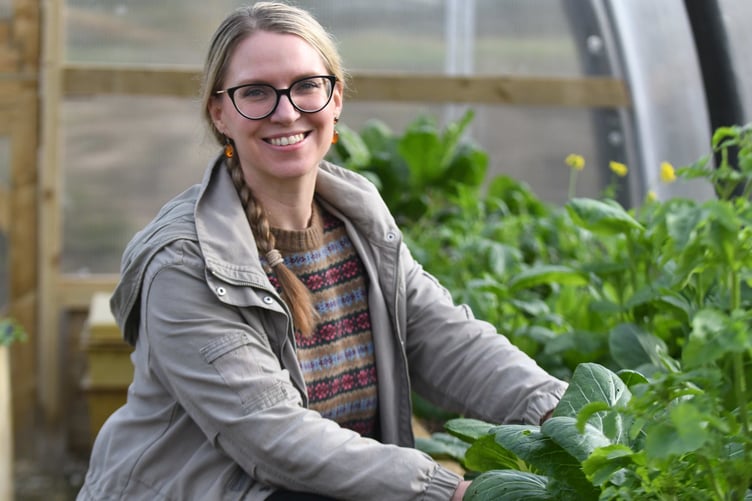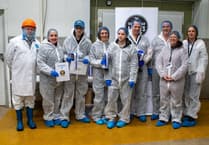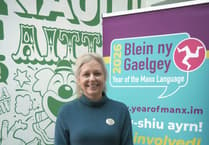Tanya Anderson is a gardener and content creator: her website, Lovely Greens, receives 15,000 viewings every day and is populated with adverts by an elite agency in the US. It’s full of videos and tips to help any would-be grower get started on their own garden but what is the reality behind the photos of glossy, freshly picked aubergines and bright summer marigolds? Is it really that easy to ‘live off the land’ and be a gardening influencer? Food & Farming went to visit her to find out.
This of course is a quiet time of year for a garden, that lull just before spring arrives when there isn’t much to see. But the structure is all there, in the form of neat raised beds and a substantial Polycrub polytunnel, designed and built to withstand the wild winds and gales of the Shetland Islands.
Tanya was originally gardening at her previous home in Baldrine and on an allotment in Laxey. She her partner Josh moved to Lezayre just over a year ago and have been busy transforming what was a rubbish-filled plot into a productive garden.
If you look on her website you will see an enviable lifestyle, trugs and planters overflowing with summer flowers, herbs, and vegetables with that sheen of just-picked freshness. It also helps that she manages to look glamorous even whilst building a compost bin from pallets.
But anyone who has ever rooted around in a garden, or grown even a single tomato, isn’t fooled. The reality is that something this good requires a huge amount of hard work and Tanya is keen to dismiss any notion of idyllic self sufficiency.
‘First of all,’ she says firmly, ‘I’m not self sufficient and I don’t know anyone who is truly self sufficient because that implies that you’re growing all of your own food and that you’re not relying on supermarkets and shops.
‘I think that’s a bit of a romantic view of what it is. I consider myself more ‘self sufficient-ish’ because it’s a happy, healthy medium, trying to aim for a future where we’re growing a lot of our own food but we’re not not shopping from the supermarket either, or from health food shops, or disregarding the fact that we live in a modern way.
‘So it’s somewhere in the middle and it’s also about understanding how our food is grown, and if we can grow it in a more sustainable way and a less expensive way.
‘There are some crops that are just so incredibly easy to grow, and cheap as well – things like salad greens.
‘You can buy them by the bag and a lot of people do, and I will even buy them by the bag at certain times of the year when I don’t have as much either, but in the growing year you could just have a few pots or trays or a small area of a garden bed and if you just keep sowing the seeds you can have salad greens pretty much the entire growing year.’
Although she grew up in America, in a family who kept chickens and preserved food, Tanya didn’t always have this sort of lifestyle. Just over 10 years ago she was living in London, working in a design studio and yearning to get away from the stress and the daily commute.
She recalls: ‘What ended up happening is that, when I first moved to the Isle of Man, I loved gardening and I was really interested in this idea of keeping bees and making skincare and it started with that.’
‘I started a blog, an actual blog. Blogs don’t really exist any more – it’s an old-fashioned term - but back in 2010, blogs still existed, where people used websites as journals. People use social media for that now.
’
It was, she says, ‘a eureka moment’ when she discovered that she could actually make money doing it.
She goes on: ‘It was never my intention: I fell into it without any awareness that this would become something that I could do as a living.
‘On my blog I was sharing some tips and some projects and I had one particular project that just blew up on the internet and it was at that point when I discovered a group of other people like me: garden content creators you would now say – in those days they were bloggers.
‘We shared a lot of information back and forth and that’s how I started monetising, initially with Google ads, and then an elite ad agency from the States that focuses on people with a lot of volume on their websites.
‘They populate your website with adverts and you can choose what type of adverts, so these are a few categories that I don’t want on my site and they handle all that so it’s passive income for me.
‘I can create helpful content that is available for people to access for free and no one needs to click on the ads for me to make money, it’s basically about the views.’
Tanya also has a YouTube channel, where she publishes new videos each week, and she has written a book, ‘A Women’s Garden’ which, along with gardening tips, also includes information on using your garden produce for making soaps and skincare items, and in recipes.
Using her garden bounty in this way is one of the reasons she aims to keep it as organic as possible. As she says on her website: ‘Each flower, herb or vegetable that I grow is going to end up either in me or someone I love’.
Her tips are also very practical.
They have to be because she does not have a staff of gardeners working for her, nor an unlimited budget, so many of her tips are aimed at saving money.
Often this is by reusing or recycling items, such as using pallets to make a planter or a cucumber trellis, or turning old newspapers into plant pots.
As we are chatting, she gives me full instructions on how to use a sheet of black plastic to prepare the soil for a no-dig vegetable bed. She is a born educator who has learned through the experience of doing all these things herself and loves to pass that knowledge on.
And that is rather the point: it is one thing to be a social media influencer for a brief spell of fame but to sustain a website and YouTube audience for more than 10 years, as Tanya has done, it needs to be authentic.
As she says: ‘That’s why I started – I’d be doing this for free anyway – and enjoying it.
‘There are some people that are becoming overnight TikTok stars but I would say, for most people I know that are doing decently at it as book authors, as YouTube creators, it’s because of persistence and consistency.’





Comments
This article has no comments yet. Be the first to leave a comment.